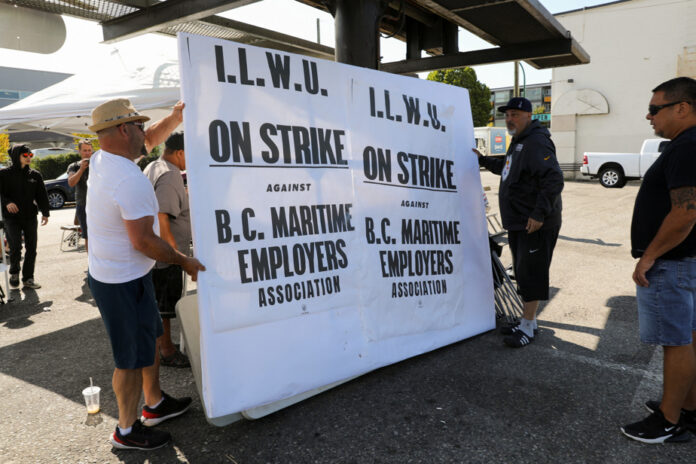The union representing the Port of Vancouver stevedores comes back and files a new 72-hour strike notice. A possible return to square one which is not reassuring for the Trudeau government, which is studying its options – including the tabling of a special law demanded by the business community.
Prime Minister Justin Trudeau convened the Incident Response Group on Wednesday afternoon to determine what the next steps will be. A phone call with the premier of British Columbia may follow.
The day was punctuated with twists and turns. It began with a verdict from the Canada Industrial Relations Board (CIRB), which declared the strike “unlawful” under the Canada Labor Code, as the union side failed to give 72 hours’ notice.
The quasi-judicial tribunal ordered the longshoremen to cease their strike activities, and ordered the International Longshoremen’s and Warehousemen’s Union of Canada to revoke its declaration of authorization to strike.
It may therefore only be a postponement, to the chagrin of a government whose patience is running out.
At a press conference at the port of Argentia, Newfoundland and Labrador, Transport Minister Omar Alghabra said he was “disappointed” to see the return of the picket lines the day before. He also deplored the fact that the tentative agreement had not been put to the vote of some 7,400 workers.
“I am at the end of my patience […] We have a responsibility to act to protect the interests and the economy of Canada”, he also dropped on the sidelines of a funding announcement. The government, the minister added, is “studying what the options are”.
That of the filing of a special back-to-work law is not ruled out.
We already know that the New Democratic Party (NDP), dance partner of the Liberals in the House of Commons, does not support the idea of a special law, any more than the Bloc Québécois.
“We have always been clear with the Liberals that we will oppose back-to-work legislation. New Democrats will always stand up for workers who demand their rights and fight for a better future,” said New Democrat Leader Jagmeet Singh.
Bloc Québécois spokesperson Julien Coulombe-Bonnafous said the party was “in favor of a negotiated settlement,” pointing out that the Bloc Québécois has never voted in favor of a back-to-work bill.
As for Conservative Leader Pierre Poilievre, he did not specify which sign he was staying at, preferring to challenge Prime Minister Justin Trudeau to announce “a plan to end this strike within the next 24 hours” because “we cannot pay the price” for such a work stoppage.
The Parliament will have to be recalled in the event of the tabling of a special law.
In the business world, the turn of events leaves a bitter taste. The first 13-day outage had already had “several million” repercussions at Olymel, which has accumulated about 3 million kilograms of fresh produce — such as pork tenderloins and loins — in its freezers.
“In a week, we will approach 5 million kilos, dropped the first vice-president of the meat processor, Paul Beauchamp, in a telephone interview on Wednesday. If the strike had ended this morning, we would have had it until September [to sell off the stocks]. These are appreciable sums sleeping on the docks and in our warehouses. »
Asia is an important market for Olymel. Each week, approximately 1.5 million kilograms of fresh produce leave its factories in Quebec and Red Deer (Alberta) for countries such as Japan and South Korea.
These cargoes are shipped out of the Port of Vancouver, basically.
Representatives of employers’ associations are now openly calling for a special law. According to Véronique Proulx, president and CEO of Manufacturiers et Exportateurs du Québec (MEQ), Ottawa did everything to support the union and the employer during the first walkout.
“I don’t see what solution is left,” she said. We wanted a negotiated agreement, but there is a limit to letting companies be penalized. We did not expect what happened. »
After surveying its members, the association says that more than one in two respondents (55%) say they have suffered paralysis at the Port of Vancouver. In addition, 33% expect to suffer from it soon.
Among financial analysts, the labor dispute at the Port of Vancouver does not worry in the short term. On the other hand, some, like Walter Spracklin of RBC Capital Markets, wonder if Canada’s reputation could be damaged. If so, the impact would go beyond exporting companies or those expecting goods from abroad.
“Labour uncertainty may cause shippers to re-evaluate their options, particularly to Midwest destinations, where Vancouver and Prince Rupert compete head-to-head with US West Coast ports,” Spracklin wrote. .
If this scenario were to materialize, the two major railways in the country, Canadian National (CN) and Canadian Pacific Kansas City (CPKC), could suffer. Approximately 40% of railcars moved by CN transit through the two western Canadian ports. For its competitor, it is around 20%.















